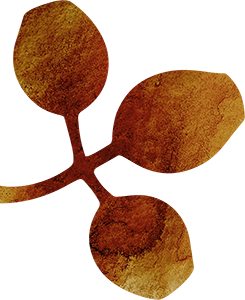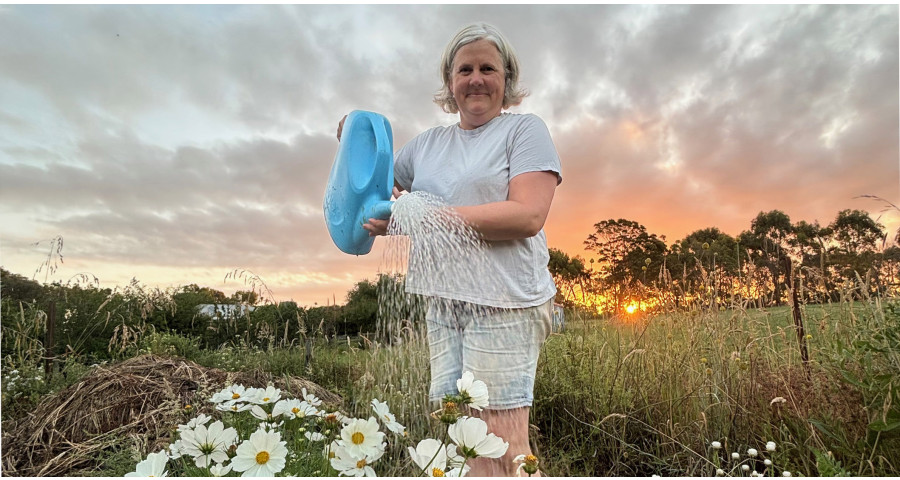Cudgee Creek Produce is our (very) small business/side hustle, developed as part of our work to care for our land in south west Victoria. Cudgee Creek Produce began in 2010 with the idea of creating and selling a few market crops in order to help us invest back into our productive garden. Over that time, we have grown food for our home and family and, through Cudgee Creek Produce, sold garlic, fruit, and flowers through markets, a few local stores, website sales of dahlia tubers, and currently through our seasonal Friday Flowers deliveries. What follows are a few reflections on this business and the way our understanding of God and economy opens up a different way of evaluating investment in this kind of work.


The success of Cudgee Creek Produce is on many levels very questionable. It has earnt us an important but marginal income: we both have main work roles and are involved in the lives of our family and community. These roles are significant in themselves and we sometimes question whether we’re stretching ourselves too thin. It’s been hard to step up and invest required capital and risk for the business to grow quickly but economically. After eight years of growing garlic and establishing a niche market of local buyers, our garlic crop succumbed to rust during an inordinately moist Spring two years ago.
Now we are taking an enforced rest from growing garlic until the rust stops showing in other plants.
However, being involved with this work provides us with so many more benefits than those determined by ‘the market’, and a fuller understanding of home economics and faith brings these to light. Connecting with people in our local area through offering something that we’ve produced, and that is beautiful, has been a source of hope, encouragement, and conviviality. Sometimes we hear stories about people buying flowers for friends, family, or neighbours going through hard times, or as a symbol of beauty for the kitchen of a household busy with work and caring.

Cudgee Creek Produce is, for us, an act of hope.
The act of working outside helps us slow down and notice so many things: the smell of soil, birdsong, the intricacy of biodiversity, the aliveness of a garden in the full photosynthetic flight of Spring, the coolness of the earth on the morning of a hot day, the sound of black cockatoos passing through or standing sentinel in our banksias. In response to an outbreak of aphids last Autumn, an army of lady bugs descended and particularly liked tucking themselves into the folds of our sunflowers and dahlia petals. I have vivid memories of being bathed in lady bugs on Thursday evenings while bunching flowers for our Friday delivery run.
Year on year, despite the challenges, we are growing in our mastery of gardening. My husband Greg has fine-tuned our compost making. I know more about growing and sequencing vegetables and flowers to produce sellable products week on week during the growing season. We generally grow enough tomatoes to be bottled for cooking right through the winter months, and we store berries, nuts and preserved fruit for eating year round.
I’m convinced that doing small things with lots of love matters. Cudgee Creek Produce is, for us, an act of hope in growing something that might someday support more of our income and maybe even provide some meaningful opportunities for others for employment, rest, and learning. However, it is also an act of faith as we participate in caring for our garden as an expression of our love for God, and that even if this is as big as our little business gets, that is alright too.

I’m convinced that doing small things with lots of love matters.
Climate change and the already evident changes in weather and seasons has become an issue by which we’ve increasingly felt both burdened and galvanised. Being connected to a parcel of land and actively loving and caring for it helps to ground our fearfulness, holds our lament, and continues to help us stay alert to the possibilities of restoration and change. We’re thinking about how to regenerate the soil and landscape by growing local trees and shrubs to support biodiversity; practising regenerative agriculture principles; and growing produce to reduce our environmental footprint. We delight in watching wallabies and koalas pass through our wildlife corridors to the creek. Holding the burdens of our hearts and minds in this place means we are looking at a global issue in the context of living things and a particular place.
The former pastor of our small congregation in Warrnambool, Alison Sampson, contributed significantly to our theological understanding of rest, connection to the landscape, and responsiveness to God being active in our lives and communities. In one of her recent blog posts online, Alison writes about Abraham and ‘the teacher trees’ (Gen 12:6): a story about Abraham resting and seeing something of Yahweh in the trees.* Sometimes, the rest and aliveness of our place catch me by surprise; a sense of God hovering and sitting nearby while I catch a moment of rest in the shade of a manna gum or apricot tree.
The work of Cudgee Creek Produce makes demands of us, but also enlivens us.
Elvira lives with her family in Cudgee on Kirrae Whurrong country.
* You can read Alison Sampson's full blogpost here.



